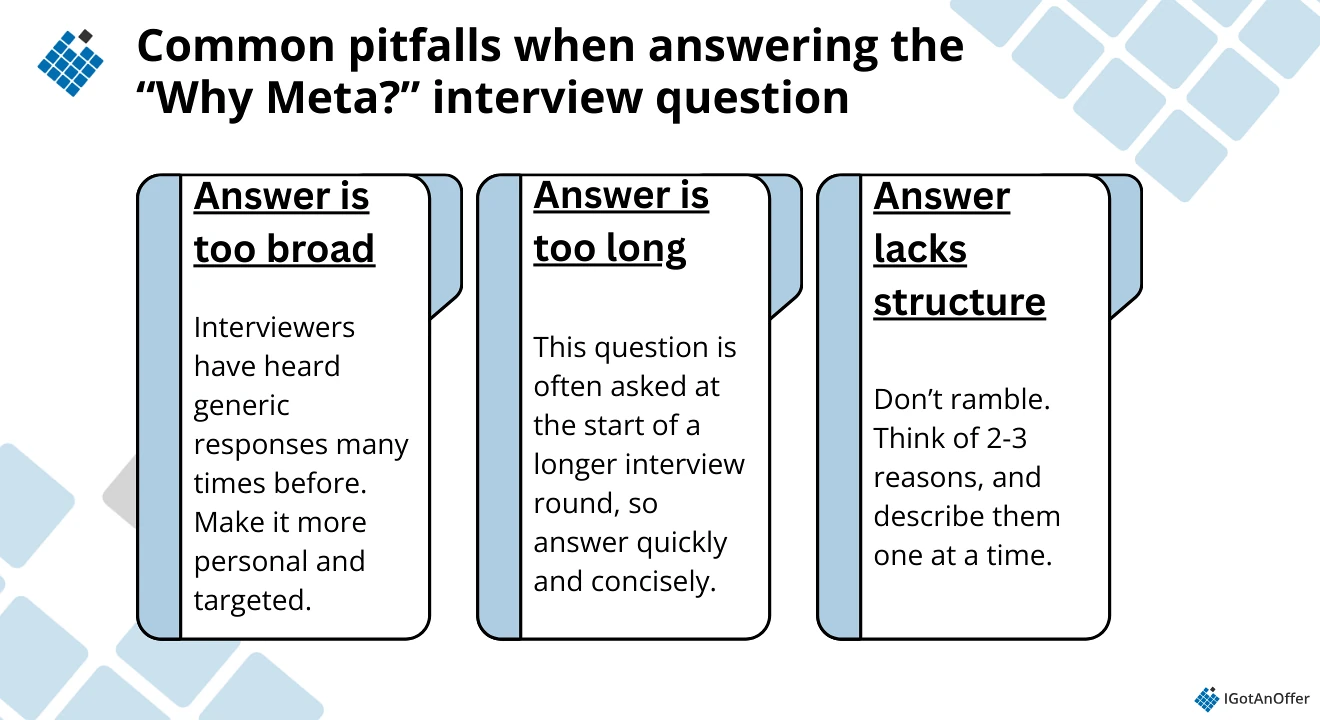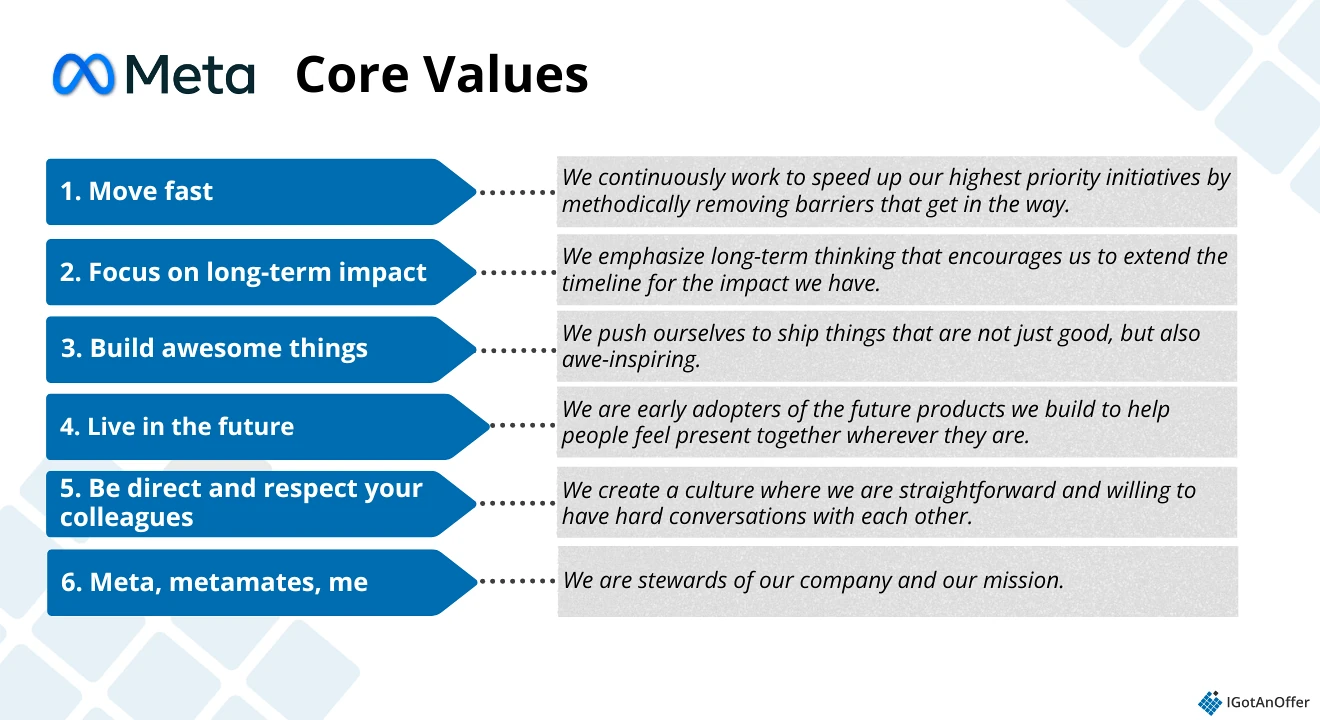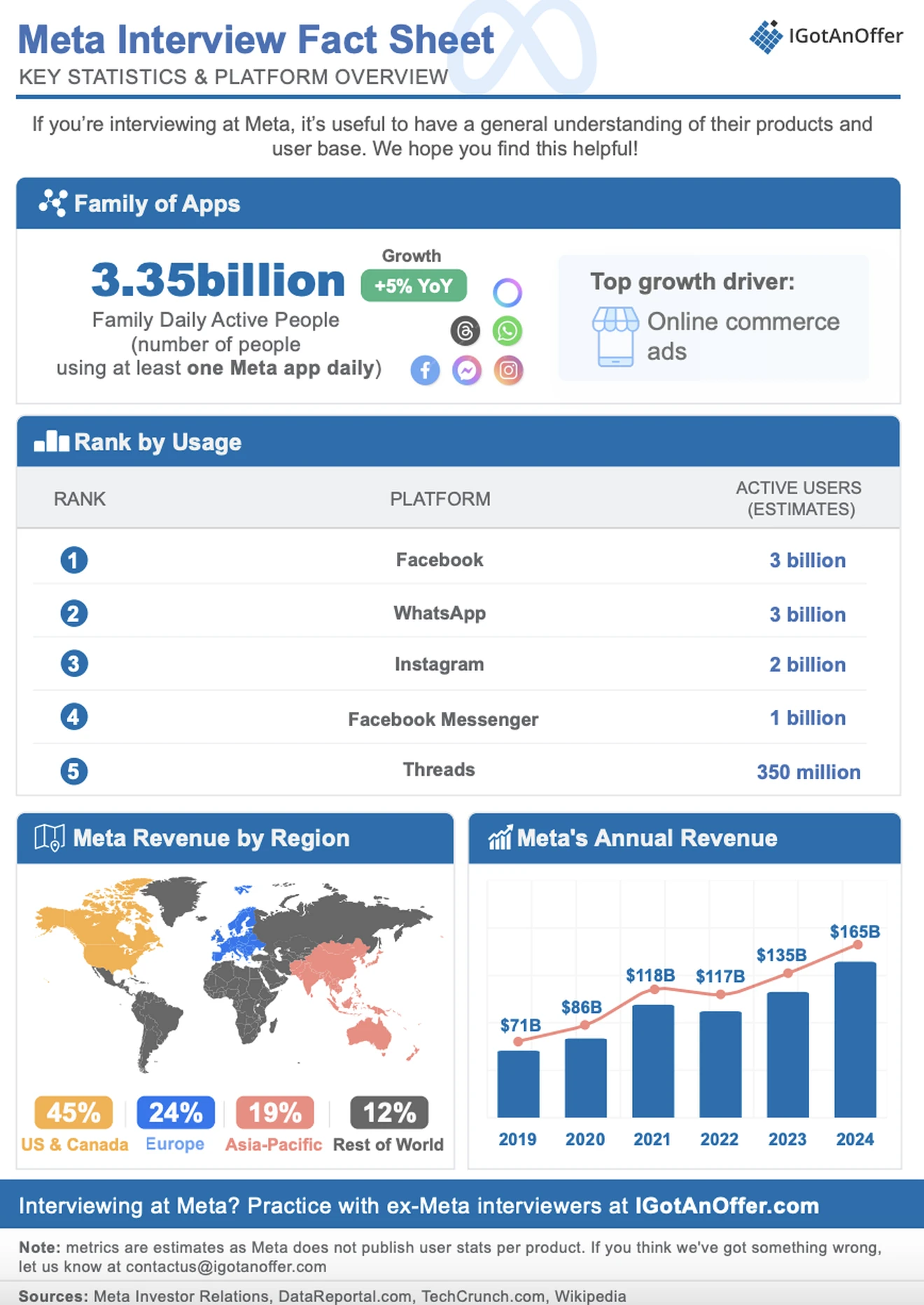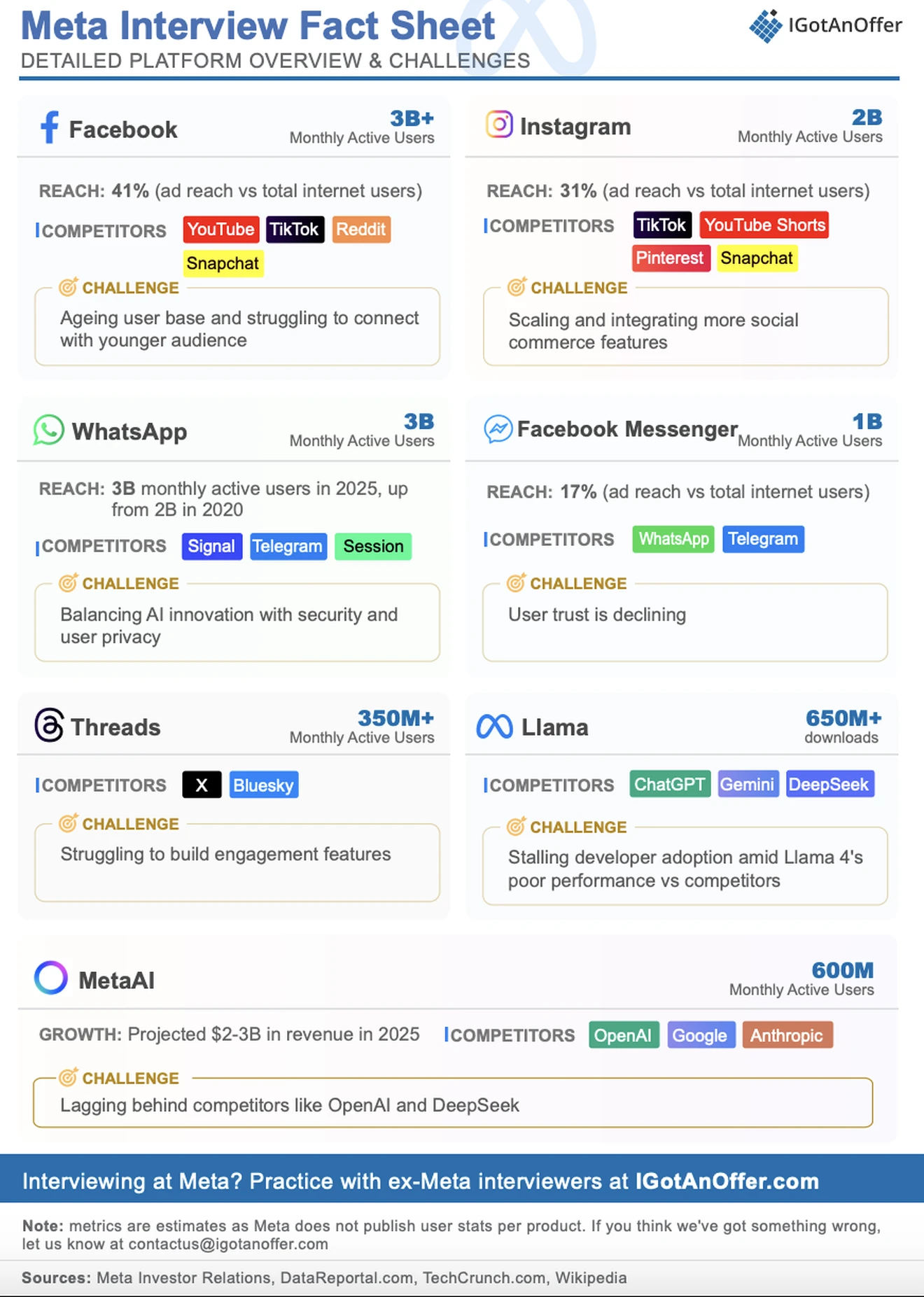Today, we’re going to give you four actionable steps that will help you craft the perfect answer to “Why Meta?” or "Why Facebook?". You can complete all of these steps in a matter of hours.
This is one of the most common behavioral questions that comes up in the Meta interview process. So it’s very important to come prepared with a specific and memorable answer.
Our first tip: do your research!
Let’s jump right into it.
- Learn why interviewers ask this question
- Study up on Meta
- Write out your answer
- Practice your answer out loud
Click here to practice 1-on-1 with ex-Meta interviewers
1. Learn why interviewers ask this question
Working at big tech companies can be exhilarating and intense, and Meta is no exception. You’ll be working on projects that impact millions of users, in a dynamic environment where things must be done well and done fast.
Interviewers ask, “why do you want to work at Meta?” to find out how much motivation you have, in order to last in the company’s fast-paced environment. If your interviewer gets the impression that you are not motivated enough, or if you have the wrong motivations (i.e. a high salary), then they won’t be inclined to hire you.
Meta also wants to get an idea of how well you’ve prepared for your interviews and researched the company in advance. As they make major decisions based on data, they’re looking for candidates who know how to do research and gather facts.
Showing up on interview day with a clear list of specific reasons on why you’d like to work for Meta is a good way to show the interviewer that you fit the profile they’re looking for.
1.1 Tips for a great answer
Here are the components of a great answer:
Tips to prepare your answer for “why do you want to work at Meta?”
- Network: Make an effort to meet with or call one or more current Meta employees, ideally from the team you’re applying to. Ask them what it’s like working there, why they chose Meta and what is unique about it. This will give you good, specific talking points for your answer, and mentioning their names shows the interviewer that you’ve put in effort to get to know the company.
- Make it personal: If you have any examples from your personal experience that tie in with Meta, now is a good time to bring them up: a Meta product that shaped how you see the world, a Meta initiative that has made a difference in your life, etc. Talk about what you value most about Meta or one of its products.
- Bring your own perspective. In the online application, Meta asks: 'How will your lived experiences (educational, professional, military, or otherwise) help you offer our product teams a new perspective as we continue to iterate our products?" Think about this and see if you can include it in your answer to "Why Meta?".
- Make it specific: Your answer for “why Meta?” should not apply to any other company. Try swapping out “Meta” with other big tech names like Google and Amazon. If the answer also works for the other companies, that’s a sign that you need to keep working.
- Give more than one reason: Aim for two to three concise reasons as to why you want to work for Meta, as well as in your team and position specifically. Adding any more reasons risks making your answer too long, and only having one reason likely won’t be a strong enough answer.
- Talk about your team: Metas an enormous company, which means that some of the reasons why you might want to work for Meta as a whole may not be specific enough. So talk about the team and role that you’re applying for, and why that is a perfect fit for you as well.
- Keep it balanced: While you want to answer this question enthusiastically, overly praising Meta or yourself will come off as disingenuous. Give real reasons as to why you want to work there, without offering empty compliments.
1.2 Common pitfalls

Finally, before moving on to the next step, take some time to review common mistakes that candidates make when answering this question.
Common pitfalls in answering “why Meta?”
- Answer is too broad: Simple answers such as “it would be a great opportunity to learn more,” “the people here are very smart and work hard,” or “the culture here is awesome” won’t make the cut on their own (even if they’re true!). Interviewers have heard these responses many times before, so you’ll need to make it more personal and targeted.
- Answer is too long: This question is frequently asked at the beginning of a longer interview round or during the initial screening process. In both cases, it’s important to answer quickly and concisely, so that the interviewer can understand your answer and have time for other questions. Aim for a roughly 1-minute response.
- Answer lacks structure: Think of two or three reasons you’d like to work there, and describe each of them, one at a time. Otherwise, the interviewer will have difficulty following your train of thought, and you are more likely to ramble.
2. Study up on Meta

It’s time to start putting together the components of your answer. That means learning about Meta.
As we mentioned in our tips, a good way to get an inside scoop about the company is to reach out to current or past employees of Facebook /Meta to get an idea of what the company is like.
You can also learn a lot about a company by asking candidates about their interview experience at Meta.
In addition to networking, do some research about Meta's culture and values. Here are a few general resources to get you started:
- Meta's 6 core values (by Meta Careers)
- Mark Zuckerberg’s “hacker culture at Facebook” (by Mark Zuckerberg, via Wired)
- Meta annual reports and strategy presentations (by Meta)
- Meta's approach to tech trends (by CB Insights)
- Meta org culture analysis (by Panmore Institute)
For a more in-depth guide to Meta interviews in general, we also created our very own Meta interview fact sheet:


You’ll also want to tailor your answer to the position that you’re applying to. If you’d like more information about top tech roles at Meta, including practice questions and preparation tips, take a look at one of our interview guides:
- Meta PM (product manager)
- Meta rotational product manager
- Meta product marketing manager
- Meta product designer
- Meta program manager
- Meta technical program manager
- Meta software engineer
- Meta engineering manager
- Meta data engineer
- Meta production engineer
- Meta front-end engineer
- Meta machine learning engineer
- Meta research engineer
- Meta data scientist
- Meta research scientist
- Meta account manager
Once you’ve got an idea of the company as a whole, you’ll need one or two more specific details about Meta that you can use to customize your answer.
2.1 What sets Meta apart
There are many similarities between big tech companies that can make the “why do you want to work at this company?” question difficult to answer with specificity.
So we’ve put together a few more unique facts about Meta that you can choose from to help make your answer as specific and personal as possible.
What sets Meta apart
- There is an uncommon amount of autonomy and flexibility given to Meta employees. As Don Faul, a former Facebook executive, puts it, “you get zero credit for your title. It’s all about the quality of work, the power of your conviction, and the ability to influence people.” If having the freedom to choose what you do and how you do it is appealing to you, tell the interviewer, along with an example of how you’ve used that freedom to do great things in the past.
- There has been a lot of buzz around the company’s creation of the Metaverse, an online experience “sometimes expanded into three dimensions or projected into the physical world.“ If you’re excited about new opportunities in virtual and augmented reality, and especially if you’re applying to join a team working directly on developing the Metaverse, this is an exciting new development to talk about in the interview.
- Meta is also a very impact-oriented and bottom-up company. There is a “move fast and break things” mentality that means things get done quickly, with minimal red tape. If you’re the type of person who likes to get things done at a fast pace, this would be a key trait to talk about.
- The company is very proud of its products, from the legacy Facebook app itself, to the newer additions like Meta Quest and Meta Portal. If any of Meta’s products have made a significant impact in your life or have inspired you in your current work, put the spotlight on that product and discuss the specific details that make it great.
Need help in your tech career?
Our career coaches can show you how to get to where you want to be, whether that's at Meta or elsewhere. Book a product management career coaching session or a software engineering career coaching session and get clarity on your next steps.
3. Write out your answer
Using the information above, you should be able to put together a list of two or three distinct reasons as to why you would like to work for Meta. The list can include information from the resources we’ve given you, examples from your network, facts you’ve found in your own research, and/or reasons from your own personal experience.
Using this list, write out your complete answer to the question, “why do you want to work at Meta?”
Once you’ve written your answer out, you’ll also need to edit it. Make sure that you are stating the most relevant information, without too many extra details. You should be able to speak through it in one minute or less.
To give you some inspiration, we’ve included an example below. Note that it is specific to Meta, takes no more than one minute to recite, and highlights the candidate’s skills without bragging.
Sample answer: Why do you want to work at Meta?
I want to work at Meta for three reasons.
First, I've worked on messaging products for the past few years, and I’ve been inspired by the Facebook Messenger app in much of my work, particularly with how AR effects have been built into the system. It’s why I applied to join the Messenger team, whose work impacts more than 1 billion people.
Second, I went to school with Marina Bayard, an engineering manager for Messenger, who recommended I apply. I really enjoyed my discussion with her as she seemed to be truly passionate about Meta’s company culture and flat organizational structure. She praised how much it allowed her to be autonomous and get things done.
Finally, I'm attracted to Meta’s culture of moving fast and being bold. These are some of the values I’ve tried to implement myself, removing unnecessary steps from my company’s previous lengthy approval process, so my reports could get things done faster. I'm excited to join a team that thinks along similar lines.
4. Practice your answer out loud
You’ve made it to the last step of preparing your answer to “why Meta?”.
By now, you should have an answer written out and edited down to the most pertinent information.
It’s time to practice speaking through your answer, so that you’re able to recite it naturally, without missing any key details.
Here are two steps to prepare for this:
4.1 Practice on your own
If you haven’t already, recite your answer and time yourself. If it is longer than one minute, edit your answer down even more.
Recite your answer a few more times, until you are able to speak through it easily, without having to refer to your notes. Ideally, it should not sound too rehearsed, while managing to hit each of the main points.
Film yourself speaking through your answer, to get a sense of how you deliver it. Make note of your body language, as well as places you may be stumbling over important details or speaking too mechanically.
Repeat this process until you’re able to answer the question enthusiastically, with engaging body language and a smooth response.
4.2 Practice with peers
Try out your answer in an interview setting by doing mock interviews. If you have friends or peers who can do mock interviews with you, that's an option worth trying. It’s free, but be warned, you may come up against the following problems:
- It’s hard to know if the feedback you get is accurate
- They’re unlikely to have insider knowledge of interviews at your target company
- On peer platforms, people often waste your time by not showing up
For those reasons, many candidates skip peer mock interviews and go straight to mock interviews with an expert.
4.3 Practice with experienced interviewers
In our experience, practicing real interviews with experts who can give you company-specific feedback makes a huge difference.
Find a Meta interview coach so you can:
- Test yourself under real interview conditions
- Get accurate feedback from a real expert
- Build your confidence
- Get company-specific insights
- Learn how to tell the right stories, better.
- Save time by focusing your preparation
Landing a job at a big tech company often results in a $50,000 per year or more increase in total compensation. In our experience, three or four coaching sessions worth ~$500 make a significant difference in your ability to land the job. That’s an ROI of 100x!















